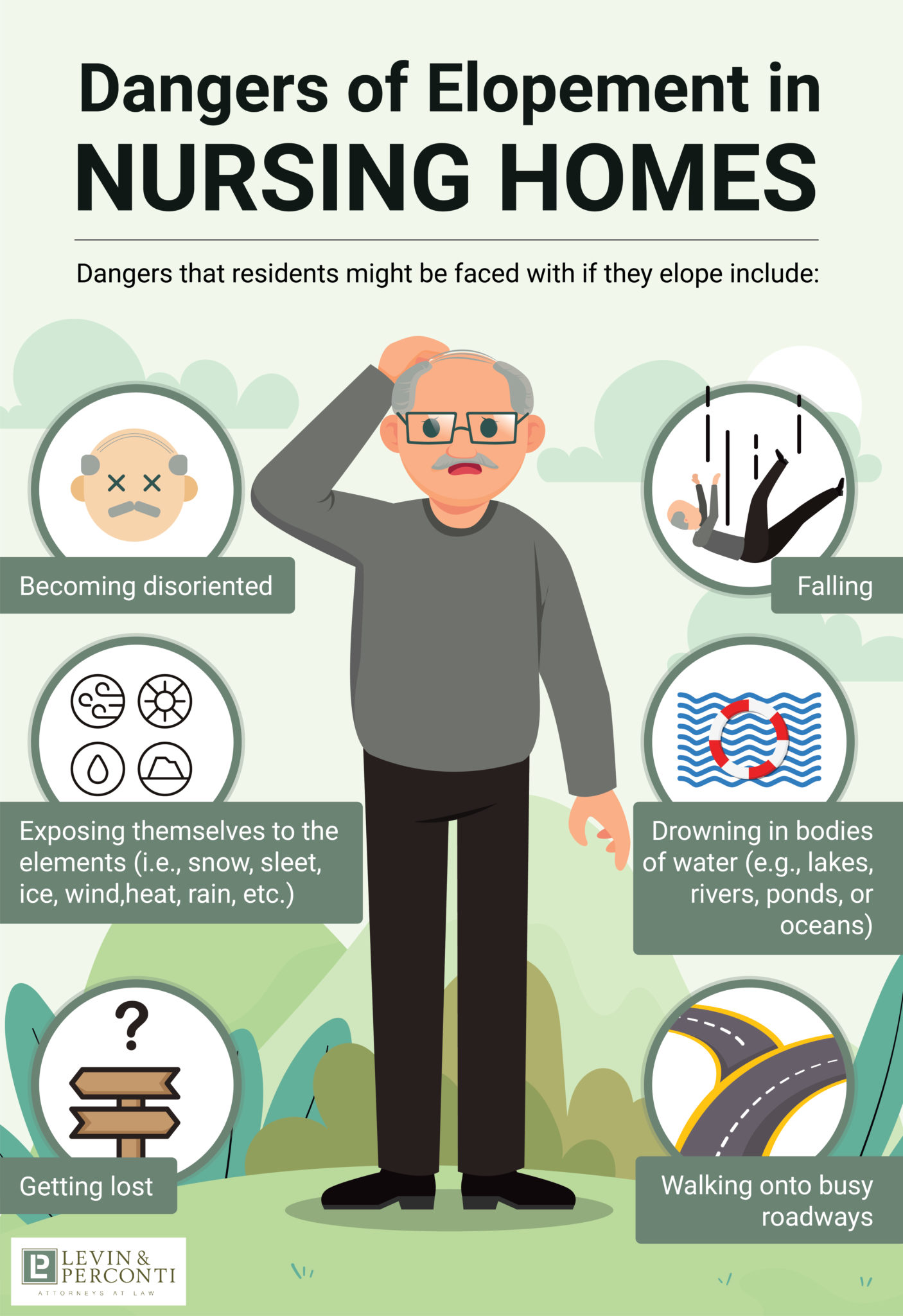Table of Content
Rooms with aquariums or interesting decorations and artwork tend to hold attention and decrease the risk a resident will walk off. An area with a circular floor plan or enclosed outdoor spaces can provide easy pathways for residents to follow while also allowing for supervision. Removing tripping hazards, securing or removing rugs, and using good lighting throughout the area can help reduce the risk of falls. Night lights can illuminate areas to help prevent falls and stumbles should wandering occur at night or in areas with low light. For more than 30 years, I and my firm have been fighting for residents and families in these cases throughout Ohio.
Staff members who work in nursing homes must receive proper training in order to be able to sufficiently deal with elopement and ensure security measures are in place. Staff members must also remain vigilant to make sure that nursing home residents do not leave the facilities without supervision and a proper exit procedure. Elopement is a similar concept to wandering; however, with elopement, the elderly nursing home resident actually leaves the facility, unnoticed, and unsupervised. Unmistakably, nursing home patients with physical problems that prevent their mobility are less prone to elopement than those who can walk properly. If an elderly person has had a history of previous elopement, family members should let the nursing home staff know so they can prevent further incidents of wandering from happening.
What is Elopement in a Nursing Home?
Wandering happens when residents with cognitive or neurological conditions move through their nursing home facility without reason or awareness of their personal safety. Unlike elopement, these residents do not venture outside or leave the facility’s grounds. Elopement may be intentional or unintentional, but the ultimate result is that a confused resident leaves the protection of the medical facility.

During the survey, officials observe everything, including the nursing home’s systems, processes, staff, finances, and more. State Surveys According to the Centers for Medicare & Medicaid Services, nursing homes that participate in Medicare ... Our nursing home neglect attorneys are experienced in handling these emotionally challenging cases. We treat our clients with compassion and guide them through every step of the legal process.
Get Started Today
The danger of elopement comes from the mental and physical state of the patient. Those residents who suffer from dementia or Alzheimer’s disease are more at risk for harm because they could easily get lost. Those who are mentally sound but who have physical limitations could fall and hurt themselves without proper supervision.

Nursing homes care for residents 24 hours a day, 7 days a week, and 365 days a year, so security systems to protect against elopement of people suffering from Alzheimer’s must be functioning properly all the time. The motivation behind the resident’s wandering helps nursing home staff to categorize the behavior, which in turn aides in creating the best plan of care to protect the resident. The nursing home is responsible for providing each resident with an appropriate plan of care to prevent or at the least, curb wandering.
Preventing Elopement in Nursing Homes & Long-term Care Facilities
In a nursing home, individuals with Alzheimer’s disease and other mentally sick conditions may suffer elopement during their stay. It is common for patients to leave a nursing home without notice if they elope . When this happens, the stray patient is discovered immediately outside the building and escorted back in by a staff member. …Our patient care as well as patient safety was clearly a priority to NEPPS. There are many causes of wandering in senior living communities and many reasons why a resident may feel the need to wander.
There are certain rules and regulations that nursing home facilities must follow. If a nursing home or assisted living facility fails to sufficiently protect or care for its residents, serious injuries and even death may occur. Nursing homes must make sure that they are properly staffed and able to handle elopement cases. It is also necessary for nursing home staff to be well-trained in how to protect residents from wandering, and how to handle these incidents if they do occur. According to the American Psychological Association, the Cohen-Mansfield Agitation Inventory is based on a 29-item scale that assesses a person’s risk of agitation. It asks questions about a person’s behaviors, including if they responded with verbally agitated, physically nonaggressive, or physically aggressive behaviors.
It’s estimated that one in five people with dementia wander and that 72% of people who elope attempt to do it again. Perhaps the most critical prevention for wandering and elopement is having an appropriate staff to resident ratio. Those staff members should be trained in wandering and elopement prevention.
Alzheimer’s Association, elopement or wandering are common issues among the elderly who have conditions such as Alzheimer’s disease or other types of dementia. Residents who wander may have mental impairments and be unable to return home once they find themselves outside the facility. Wandering and elopement should never happen while an elderly person is under the care of a nursing home.
There should also be comfortable wearables that can identify, track, and locate residents who are prone to wander. Over the course of the pandemic, 1 in 5 COVID-19 deaths was among those who were in a long-term care facility. As nursing home leaders redouble efforts to get staff and residents boosted with the new vaccine version, now recommended for those 6 months and older, they face complacency, misinformation and COVID-19 fatigue. They are calling on the White House for help with an “all hands on deck” approach.

Residents with full mobility to walk who also suffer from impaired cognitive function are most at risk for elopement incidents. If your elderly loved one has a history of wandering or elopement, it’s crucial to inform the nursing home and staff members so they can be monitored more closely. Elopement occurs when nursing homes fail to provide adequate care due to improper nursing home elopement policies, understaffing, and other procedural issues.

No comments:
Post a Comment